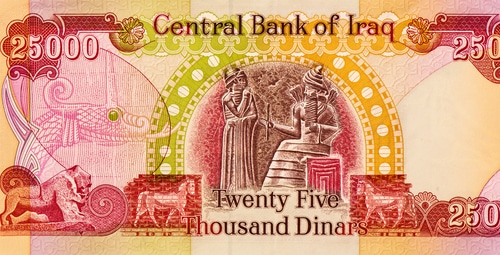The Iraqi dinar (IQD) has been a topic of curiosity and debate for years, especially among those pondering it as a potential investment or understanding its place in currency exchange. With its history tied to the region’s vast oil reserves and fluctuating economic conditions, it’s not hard to see why the dinar captures attention. However, whether you’re considering investing in it or simply looking to exchange currency for a trip, understanding the intricacies of the IQD is essential.
This post will cover everything you need to know about the Iraqi dinar, from its history and current value to the risks, potential, and options for exchanging it. By the time you finish, you’ll feel confident and informed about how to approach this currency.
A Brief History of the Iraqi Dinar
The Iraqi dinar (IQD) became the official currency of Iraq in 1932, replacing the Indian rupee that was used during a period of British control. Early on, the dinar was pegged to the British pound and later the U.S. dollar, giving it significant stability.
However, things changed dramatically following the Gulf War and subsequent decades of political instability. Sanctions, regime changes, and a devastated economy caused massive disruptions to the currency. The IQD’s value fluctuated heavily during this period, leading to massive speculation among international investors.
Today, the dinar remains the official currency of Iraq, issued and regulated by the Central Bank of Iraq. However, its value and exchange rates are affected by the country’s oil-dependent economy, geopolitical challenges, and post-war reconstruction efforts.
Understanding the Current Value of the Iraqi Dinar
The Iraqi dinar’s value is relatively low compared to major global currencies like the U.S. dollar, euro, or British pound. For reference:
- 1 U.S. dollar is currently worth around 1,300–1,500 Iraqi dinars (depending on market fluctuations and where you exchange it).
- The dinar is not freely convertible in many countries, meaning you may not easily find exchange services that deal with it.
This low exchange rate has made the dinar appealing to certain investors searching for currencies to buy in bulk, hoping for a future revaluation or strengthening of the IQD. But is it a wise investment? More on that shortly.
Is the Iraqi Dinar a Good Investment?
Over the years, the idea of investing in the Iraqi dinar has gained traction, largely due to rumors and speculation that the currency will one day undergo a massive revaluation. Proponents of the idea believe Iraq’s vast oil reserves and rebuilding economy could lead to significant gains in value.
However, there are critical points to consider before approaching the dinar as an investment:
1. Limited Convertibility
The dinar is not a widely traded or internationally recognized currency. This means it’s not available on major foreign exchange markets, limiting your ability to buy, sell, or trade it easily.
2. High Speculation, High Risk
Much of the buzz around the dinar being a lucrative investment is based on speculation rather than clear economic indicators. While Iraq’s oil reserves may imply economic potential, the country’s complex political and economic environment could mean years or decades before any significant currency valuation changes occur.
3. Lack of Transparency
Be cautious when purchasing Iraqi dinars from vendors that promise guaranteed returns. Unfortunately, there have been scams targeting investors by exaggerating potential value growth and selling counterfeit currency.
If you’re considering the IQD as an investment, treat it as highly speculative and recognize the risks involved. Diversify your investments and don’t rely on unverified promises of enormous payouts.
How to Exchange Iraqi Dinars Safely
If you’re traveling to Iraq or possess Iraqi dinars and would like to exchange them, understanding the correct process is essential to ensure you receive fair value and avoid potential scams.
1. Look for Authorized Dealers
Not all currency exchange services handle Iraqi dinars, especially in countries where IQD is not commonly traded. Seek out authorized dealers or banks with experience in foreign currencies to ensure safe and fair transactions.
2. Be Aware of Exchange Rates
Rates for the dinar can vary significantly depending on the dealer, location, and the official vs. market rate. Use online currency converters or check with the Central Bank of Iraq for the latest official exchange rate before making any transactions.
3. Check Any Associated Fees
Some currency exchange services charge steep fees for converting niche currencies like the dinar. Don’t hesitate to compare rates and fees at multiple vendors.
4. Avoid Cash Deals
If possible, use a secure and traceable method for your transactions rather than dealing with cash in unregulated environments. This helps protect against counterfeit currency issues.
The Future of the Iraqi Dinar
The future of the Iraqi dinar depends greatly on Iraq’s economic and political trajectory. Some key factors that could influence the currency’s standing include:
- Economic growth: Iraq’s oil industry continues to recover, but diversifying the economy will likely be crucial for boosting the dinar’s value.
- Stability: Political and social stability are integral to improving investor confidence in the country and its currency.
- Monetary policy: Decisions by the Central Bank of Iraq regarding inflation control and currency reforms could significantly impact the IQD.
While there is potential for the dinar to gain value over time, the timeline and likelihood of this change should be regarded with cautious optimism.
What to Know Before You Act
Whether you’re considering the Iraqi dinar as a travel currency or an investment, here’s what you should keep in mind:
- Do your research before buying or exchanging dinars.
- Manage expectations and avoid speculative purchasing unless you’re prepared for long-term uncertainty.
- Rely on trusted dealers or services and verify exchange rates and fees.
If you feel overwhelmed or unsure, it’s always a good idea to consult with financial experts before making any decisions involving foreign currencies.
